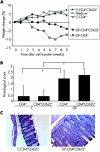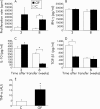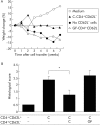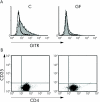Influence of intestinal bacteria on induction of regulatory T cells: lessons from a transfer model of colitis
- PMID: 15987795
- PMCID: PMC1774752
- DOI: 10.1136/gut.2004.059451
Influence of intestinal bacteria on induction of regulatory T cells: lessons from a transfer model of colitis
Abstract
Background: The resident flora plays a critical role in initiation and perpetuation of intestinal inflammation, as demonstrated in experimental models of colitis where animals fail to develop disease under germ free conditions. However, the importance of exposure to commensal bacteria before the onset of colitis is unclear. Our aim was to investigate the influence of previous exposure of donor animals to bacterial antigens on colitis development using a transfer model.
Methods: Clinical course and histology were evaluated after transfer of CD4(+)CD62L(+) lymphocytes from germ free and conventionally housed donor mice into SCID recipients. Cotransfer of CD4(+)CD62L(+) cells with CD4(+)CD62L(- )lymphocytes from both groups of mice was initiated. Lymphocytes were analysed by FACS, polarisation potential of cells determined, and cytokines measured within the supernatant by enzyme linked immunosorbent assay.
Results: Animals that received cells from germ free donors developed an earlier onset of colitis compared with mice reconstituted with lymphocytes from conventionally housed animals. Additionally, CD4(+)CD62L(- )cells from germ free mice were not able to abrogate colitis induced by cotransfer with CD4(+)CD62L(+) lymphocytes whereas CD4(+)CD62L(- )T cells from normal mice ameliorated disease. The higher percentage of CD4(+)GITR(+) expressing lymphocytes and the production of interleukin 10 after priming by dendritic cells suggests the presence of T(reg) cells within the CD4(+)CD62L(+) lymphocyte subset derived from conventional housed mice and assumes a lack of T(reg) cells within germ free mice.
Conclusion: The results indicate that bacterial antigens are crucial for the generation and/or expansion of T(reg) cells in a healthy individual. Therefore, bacterial colonisation is of great importance in maintaining the immunological balance.
Figures






Similar articles
-
T cell-dependent protective effects of CpG motifs of bacterial DNA in experimental colitis are mediated by CD11c+ dendritic cells.Gut. 2010 Oct;59(10):1347-54. doi: 10.1136/gut.2009.193177. Epub 2010 Aug 23. Gut. 2010. PMID: 20732920
-
CpG motifs of bacterial DNA exert protective effects in mouse models of IBD by antigen-independent tolerance induction.Gastroenterology. 2009 Jan;136(1):278-87. doi: 10.1053/j.gastro.2008.09.022. Epub 2008 Sep 25. Gastroenterology. 2009. PMID: 18952084
-
Long-lived colitogenic CD4+ memory T cells residing outside the intestine participate in the perpetuation of chronic colitis.J Immunol. 2009 Oct 15;183(8):5059-68. doi: 10.4049/jimmunol.0803684. Epub 2009 Sep 28. J Immunol. 2009. PMID: 19786550
-
Control of immune pathology by regulatory T cells.Novartis Found Symp. 2003;252:92-8; discussion 98-105, 106-14. Novartis Found Symp. 2003. PMID: 14609214 Review.
-
Immuno-bacterial homeostasis in the gut: new insights into an old enigma.Semin Immunol. 2001 Jun;13(3):187-94. doi: 10.1006/smim.2001.0312. Semin Immunol. 2001. PMID: 11394961 Review.
Cited by
-
Impacts of gut bacteria on human health and diseases.Int J Mol Sci. 2015 Apr 2;16(4):7493-519. doi: 10.3390/ijms16047493. Int J Mol Sci. 2015. PMID: 25849657 Free PMC article. Review.
-
Role of the gut microbiota in hematologic cancer.Front Microbiol. 2023 Aug 25;14:1185787. doi: 10.3389/fmicb.2023.1185787. eCollection 2023. Front Microbiol. 2023. PMID: 37692399 Free PMC article. Review.
-
IL-10 from CD4CD25Foxp3CD127 adaptive regulatory T cells modulates parasite clearance and pathology during malaria infection.PLoS Pathog. 2008 Feb 29;4(2):e1000004. doi: 10.1371/journal.ppat.1000004. PLoS Pathog. 2008. PMID: 18401464 Free PMC article.
-
Peripherally induced tregs - role in immune homeostasis and autoimmunity.Front Immunol. 2013 Aug 7;4:232. doi: 10.3389/fimmu.2013.00232. eCollection 2013. Front Immunol. 2013. PMID: 23966994 Free PMC article.
-
Mammalian gut immunity.Biomed J. 2014 Sep-Oct;37(5):246-58. doi: 10.4103/2319-4170.130922. Biomed J. 2014. PMID: 25163502 Free PMC article. Review.
References
-
- Bouma G, Strober W. The immunological and genetic basis of inflammatory bowel disease. Nat Rev Immunol 2003;3:521–33. - PubMed
-
- Elson CO, Cong Y, Brandwein S, et al. Experimental models to study molecular mechanisms underlying intestinal inflammation. Ann N Y Acad Sci 1998;859:85–95. - PubMed
-
- Boismenu R, Chen Y. Insights from mouse models of colitis. J Leukoc Biol 2000;67:267–78. - PubMed
-
- Elson CO, Cong Y, Iqbal N, et al. Immuno-bacterial homeostasis in the gut: new insights into an old enigma. Semin Immunol 2001;13:187–94. - PubMed
Publication types
MeSH terms
Substances
LinkOut - more resources
Full Text Sources
Other Literature Sources
Research Materials
